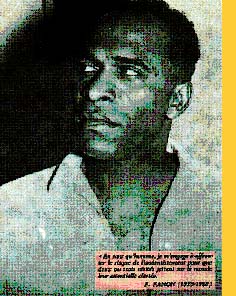|
This is the next hamper of ‘padkos’ in a menu of servings leading up to a feast on May 30th when CLP hosts a number of thinking militants engaging the politics of Frantz Fanon.
 Frantz Fanon died fifty years ago but his radical humanism remains as rich, powerful and relevant as ever. A fighting thinker and a thinking fighter, Fanon’s written work emerges out of his deep involvement in popular struggle against racist colonialism and oppression, and for genuinely humanising emancipation. Frantz Fanon died fifty years ago but his radical humanism remains as rich, powerful and relevant as ever. A fighting thinker and a thinking fighter, Fanon’s written work emerges out of his deep involvement in popular struggle against racist colonialism and oppression, and for genuinely humanising emancipation.
To mark the anniversary of his death, and to engage the legacy of his life and work, CLP has invited some of the world’s and South Africa’s leading radical and Fanonian scholars and activists to present, debate and discuss with us. It will all happen on 30th May 2011 on the Pietermaritzburg campus of the University of KwaZulu-Natal. |
| The Frantz Fanon Prize is awarded annually by the Caribbean Philosophical Association. In 2009, Nigel Gibson was a recipient in recognition of his “overall body of work in Frantz Fanon studies, which includes many essays and anthologies, including a recent set connecting Fanon’s thought to the shackdwellers’ movement in South Africa, and especially so for his influential book Fanon: The Postcolonial Imagination”.
In the year marking the 50th anniversary of Fanon’s death, Gibson has been central to bringing out two new books exploring the life, legacy and relevance of Fanon’s work and politics. On May 30th, Nigel will be joined by an extraordinary group of writers, militants and thinkers from South Africa in Pietermaritzburg: S’bu Zikode, Richard Pithouse, Michael Neocosmos, Mabogo More, Itumeleng Mosala and Bishop Rubin Phillip. For us this discussion is a practical matter – a question of praxis and living politics: what are the ways in which Fanon’s radical humanism and fighting spirit might still be relevant, helpful and challenging for the praxis of people engaged in, or connected with, grassroots emancipatory struggle here and how?
As the Church Land Programme, we are also interested to explore an important historical line connecting Fanon’s work with black theology, black consciousness and emancipatory struggles in South Africa. This history is important, and often sidelined or misrepresented in hegemonic narratives of struggles in our country. Even more important though, is the relevance and power of that tradition for current emancipatory struggles. There are those who resist oppression, and who continue to find God in the liberated minds and actions of grassroots rebellion. They demonstrate how faith and fidelity must always find expression through concrete and costly solidarity with the risen Christ in the midst of those struggles.
Between now and that event at the end of May, CLP’s padkos mailings will share some fantastic resources, most of which have been generated in the process of publishing these new books: |
Mark Butler introduces: Richard Pithouse, “Fidelity to Fanon”
Pithouse crisply extracts key features of Fanon’s philosophy to illuminate aspects of our contemporary situation.
Fanon’s commitment to the struggle of his day against colonialism didn’t blind him to the insight that “while revolutionary nationalism defeated colonialism it has failed to create a human prospect”. Fanon saw “the moment when the ‘liberating lava’ of the great anti-colonial struggles was diverted as the people were expelled from history, ‘sent back to their caves’ by leaders who ‘instead of welcoming the expression of popular discontentment’ and the ‘free flow of ideas’ proclaim that the vocation of their people is to obey”.
Pithouse reminds us that Fanon’s revolutionary humanism always implies “an affirmation of absolute equality, an orientation to all of humanity, a commitment to the self management of property held in common. … He is a philosopher of popular political empowerment – of the will of the people, of a ‘deliberate, emancipatory and inclusive process of collective self determination'”. The latter must also and always mean that the place of the ‘militant intellectual’ is “to be present in the real movements that abolish the present state of things”.
The power of all these insights for our current situation is clear – especially where the independent agency of the poor is either viewed as perverse, violent and threatening, or simply not recognised as a possibility at all. For Pithouse it is important to recognise that: |